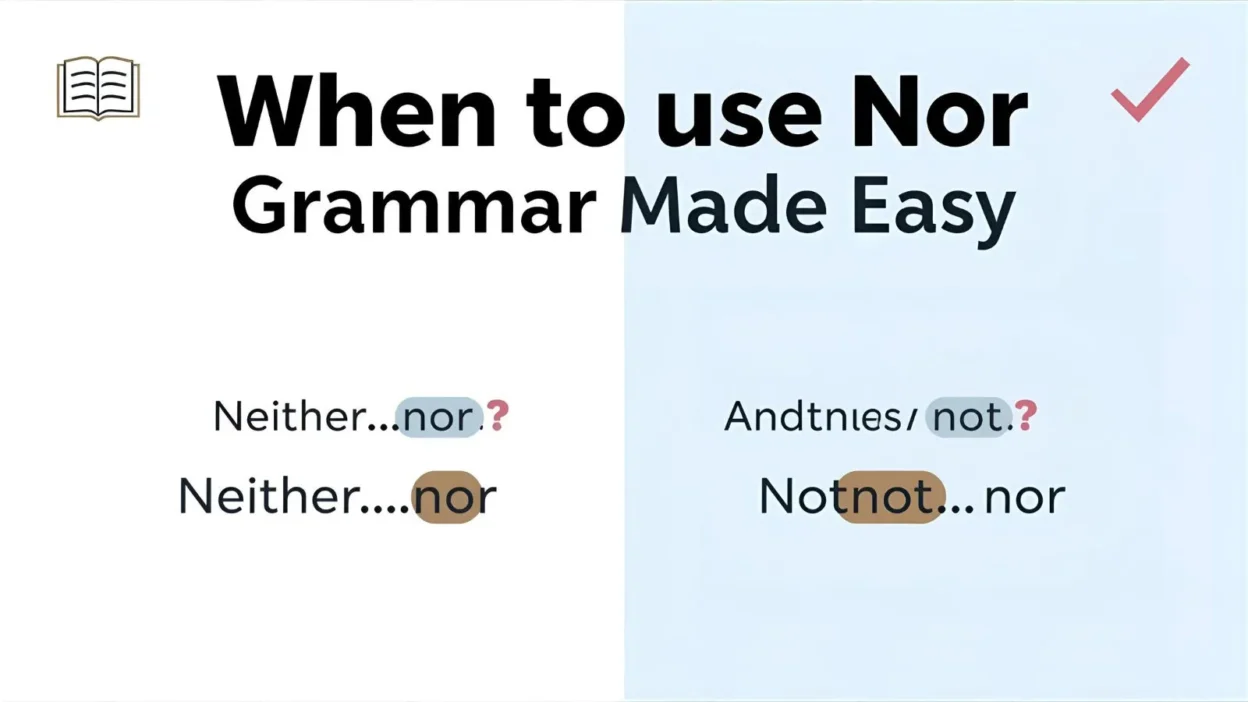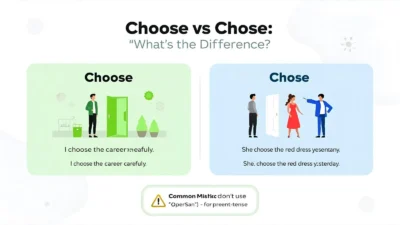Have you ever written a sentence and wondered if you should use “or” or “nor”? This confusion is very common among students, professionals, and even native English speakers. Many people search for “when to use nor” because the word feels rare, formal, or old-fashioned compared to “or.”
The truth is that “nor” still plays an important role in modern English, especially in negative sentences. Misusing it can make your writing look awkward or incorrect. At the same time, avoiding it altogether may weaken your grammar skills.
This article will explain what “nor” means, when it is correct to use it, its history, how it differs in British and American English, common mistakes, and real-life examples. By the end, you will know exactly when to use nor and how to use it confidently in both speech and writing.
When to Use Nor – Quick Answer
You use “nor” to join two negative ideas. It often comes after “neither” but can also follow another negative word like “not”.
👉 Examples:
- I have neither the time nor the money to travel.
- She does not like tea, nor does she enjoy coffee.
So, use nor only in negative contexts, not in positive choices.
The Origin of “Nor”
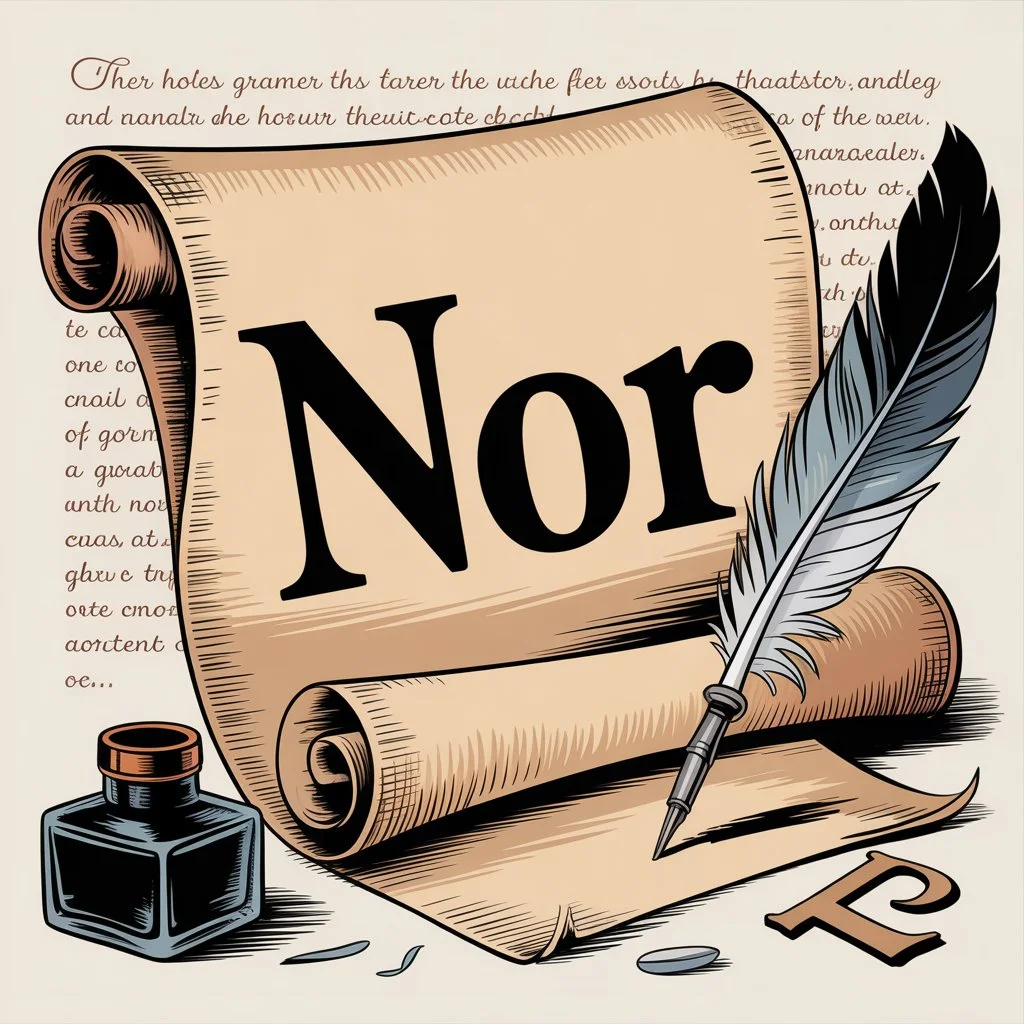
The word “nor” comes from Old English ne (not) + or. It literally meant “not…or.” Over time, it became the standard way to connect two or more negative clauses.
In older English texts, “nor” appeared more often than today. While its use has declined in casual speech, it remains important in formal writing and grammar.
British English vs American English Usage
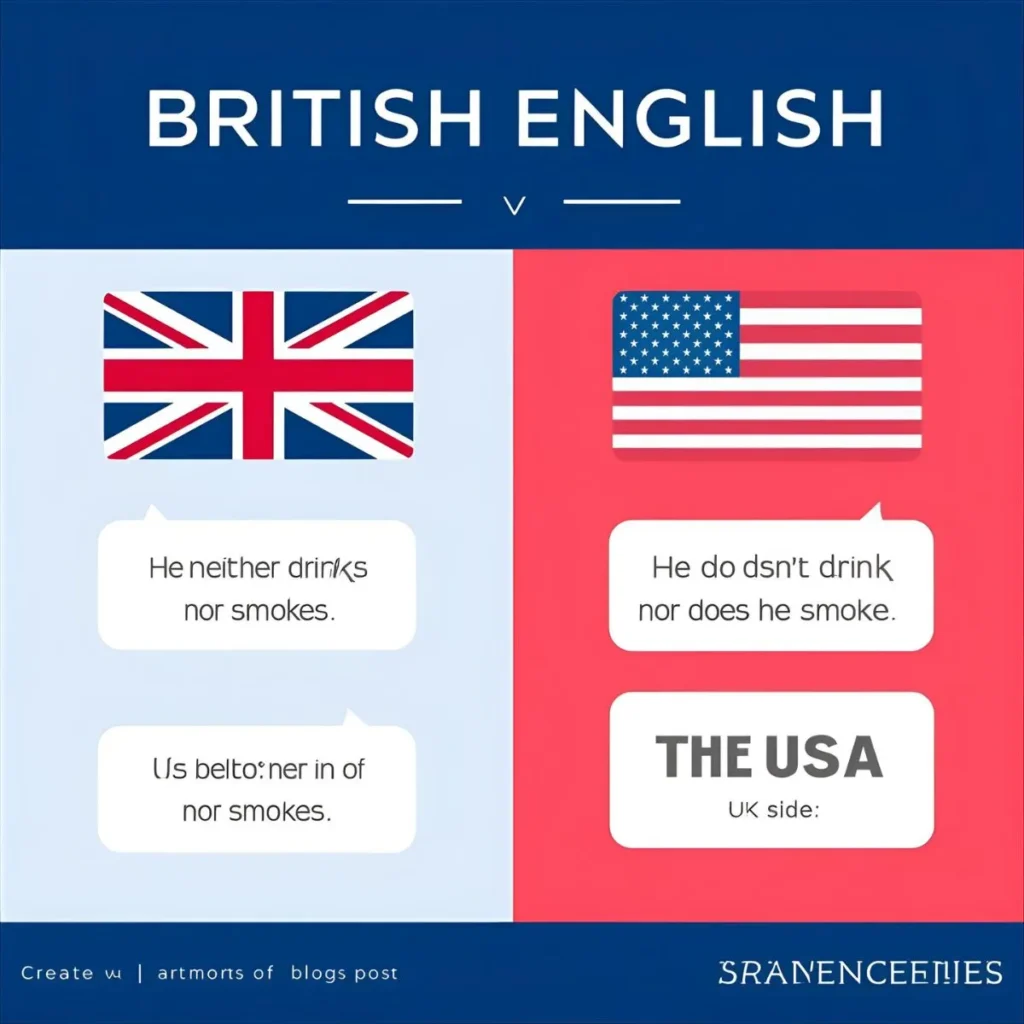
There is no spelling difference for “nor.” Both British and American English spell it the same. However, style and frequency differ:
| Aspect | British English | American English |
|---|---|---|
| Frequency | Used slightly more in formal speech/writing | Less common, often replaced by “or” |
| Example | “He neither drinks nor smokes.” | “He doesn’t drink, nor does he smoke.” |
So, while spelling is identical, American writers may use it less often, preferring simpler negative forms.
Which Usage Should You Follow?
- If you’re writing formally (essays, business, academic work): Always use “nor” when grammar requires it.
- If you’re in casual speech: Many native speakers drop “nor,” but using it correctly makes you sound precise.
- Global English learners: Learn the standard rules. Since both British and American English accept it, “nor” is always safe to use in negative structures.
Common Mistakes with “Nor”
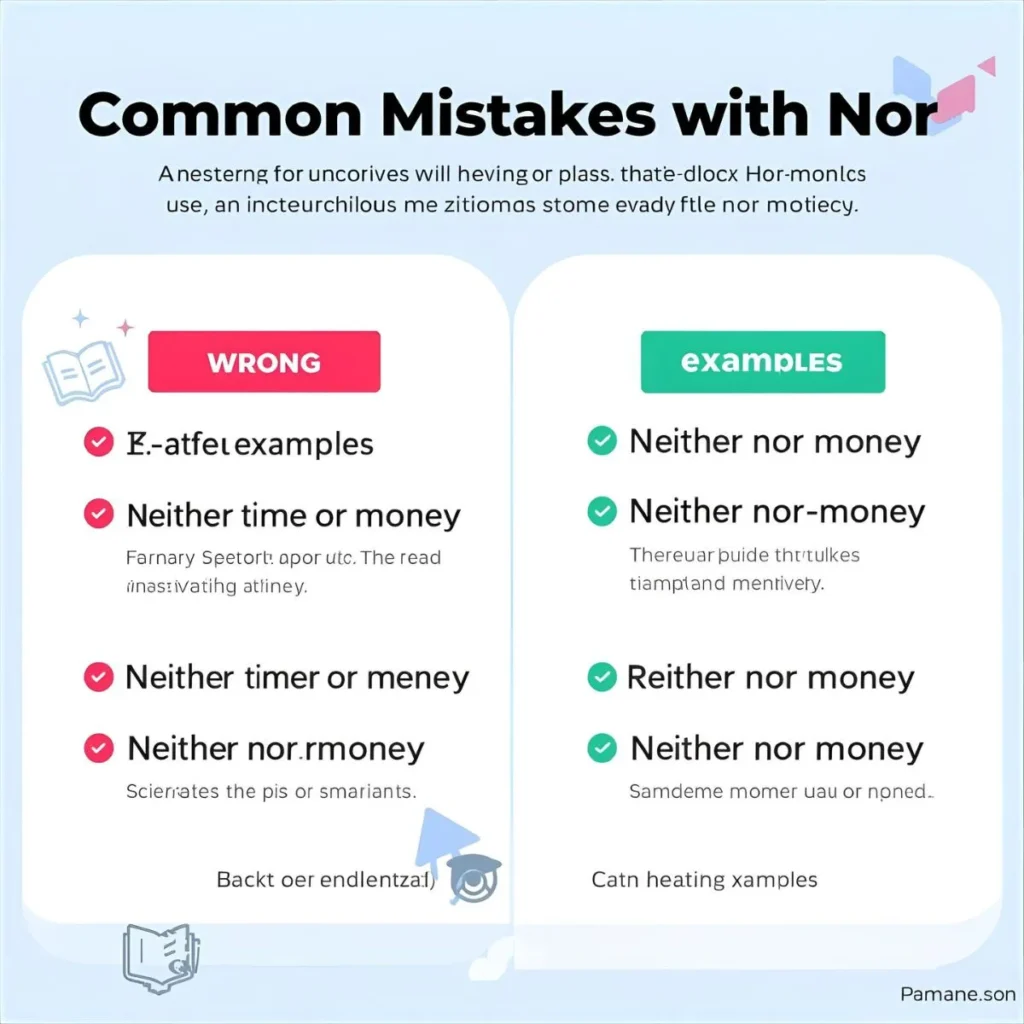
- Using “or” instead of “nor” after “neither.”
❌ She has neither time or money.
✅ She has neither time nor money. - Forgetting inversion after “nor.”
❌ He doesn’t like pizza, nor he likes pasta.
✅ He doesn’t like pizza, nor does he like pasta. - Using “nor” in positive sentences.
❌ I like tea nor coffee.
✅ I like tea or coffee.
“Nor” in Everyday Examples
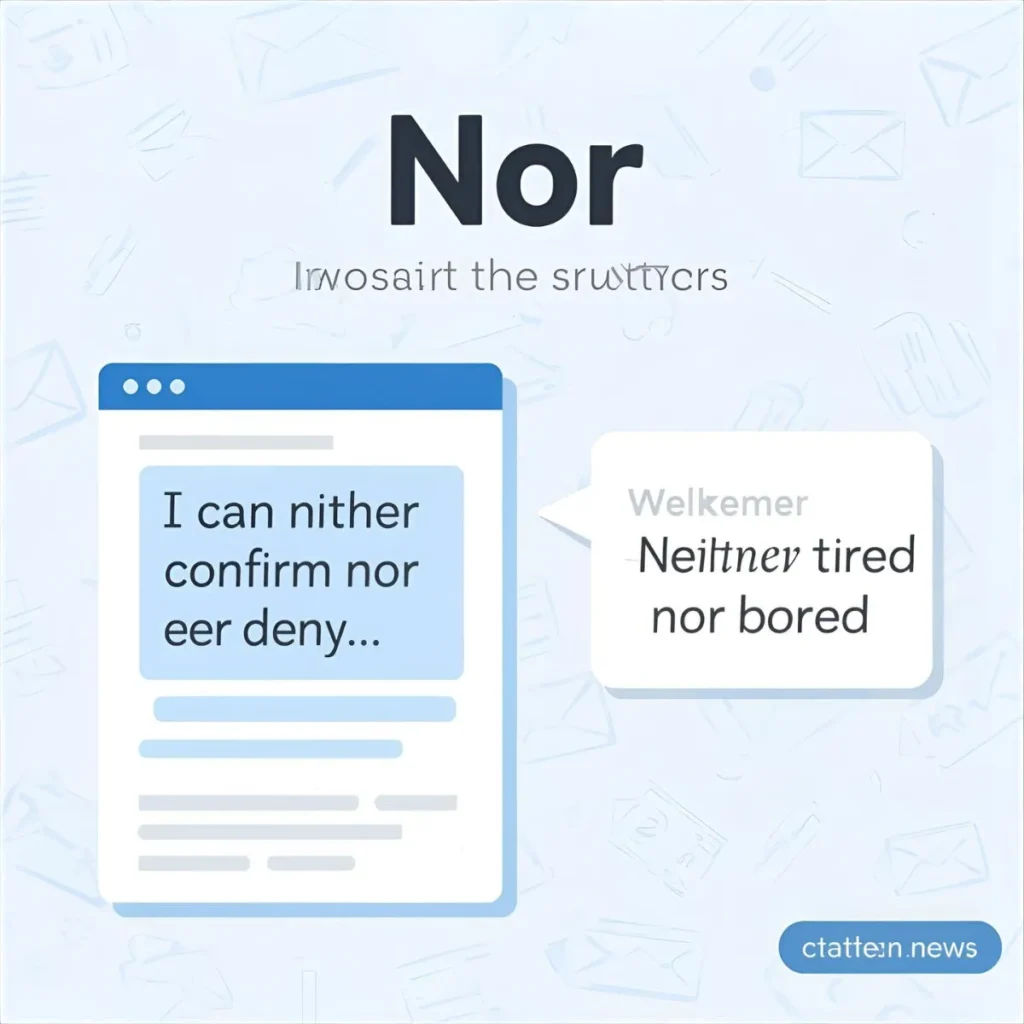
- Emails: “I can neither confirm nor deny the request at this time.”
- News Articles: “The company neither admitted nor denied wrongdoing.”
- Social Media: “Neither tired nor bored—just awake at 3 a.m.”
- Formal Writing: “The policy affects neither students nor teachers directly.”
When to Use Nor – Google Trends & Usage Data
Search data shows that “when to use nor” is most popular in countries where English is taught as a second language. Learners want to understand the difference between “or” and “nor.”
| Country | Interest Level | Context |
|---|---|---|
| India | High | Students learning formal grammar |
| USA | Medium | Writers seeking correct usage |
| UK | Medium | Academic and business writing |
| Philippines | High | English language education |
The phrase is less searched in everyday native speech communities but remains key in academic grammar guides.
Comparison Table – Nor vs Or
| Word | Use Case | Example |
|---|---|---|
| Or | Positive or neutral choices | “Would you like tea or coffee?” |
| Nor | Negative link (after neither/not) | “I want neither tea nor coffee.” |
FAQs
1. Do you always need “neither” before “nor”?
No. “Nor” can also follow another negative word like “not.”
2. Is “nor” old-fashioned?
Not really. It is less common in casual speech but still correct and important in formal writing.
3. Can I replace “nor” with “or”?
No. Using “or” in a negative sentence changes the meaning and makes it grammatically wrong.
4. Does “nor” need verb inversion?
Yes, when starting a clause: “She doesn’t sing, nor does she dance.”
5. Is “nor” used in questions?
Rarely. It is mainly for statements, not questions.
6. Is “nor” the same in British and American English?
Yes, spelling is the same. Only usage frequency differs slightly.
7. Can I use “nor” for more than two items?
Yes. Example: “He has neither time, nor energy, nor money.”
Conclusion
The question “When to use nor” often arises because the word feels less familiar than “or.” However, its role is simple: use “nor” to join two or more negative ideas. It is most common after “neither,” but can also follow “not.”
There is no spelling difference between British and American English, though usage style may vary. Common mistakes include mixing “or” and “nor,” forgetting verb inversion, or using “nor” in positive contexts.
In everyday writing—emails, news, academic work—“nor” gives your sentences clarity and precision. For learners, remembering the rule “neither…nor” is the easiest way to master it.
So, when in doubt, ask yourself: Am I linking negative ideas? If yes, then “nor” is the correct choice.
